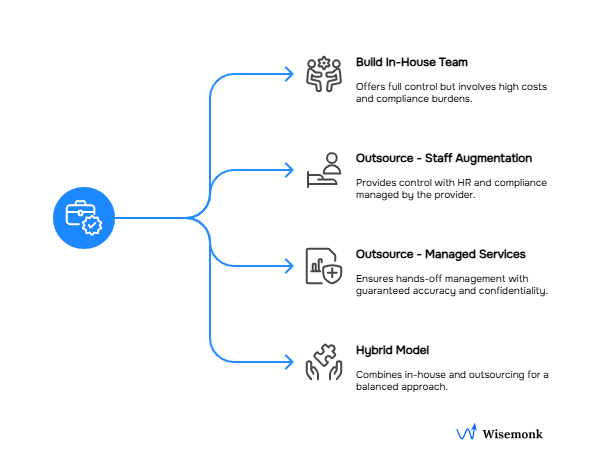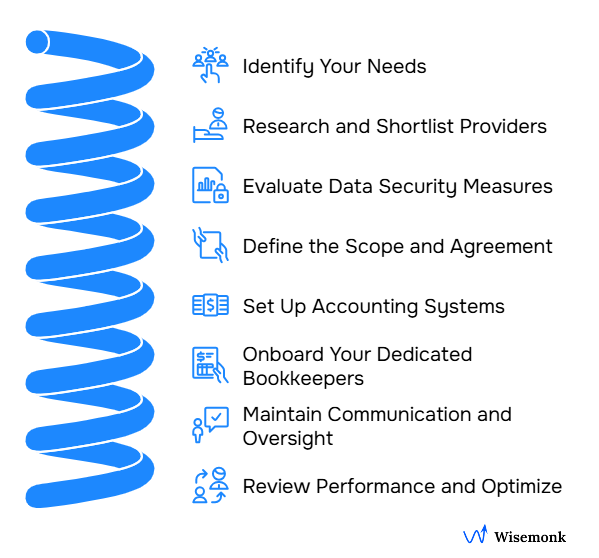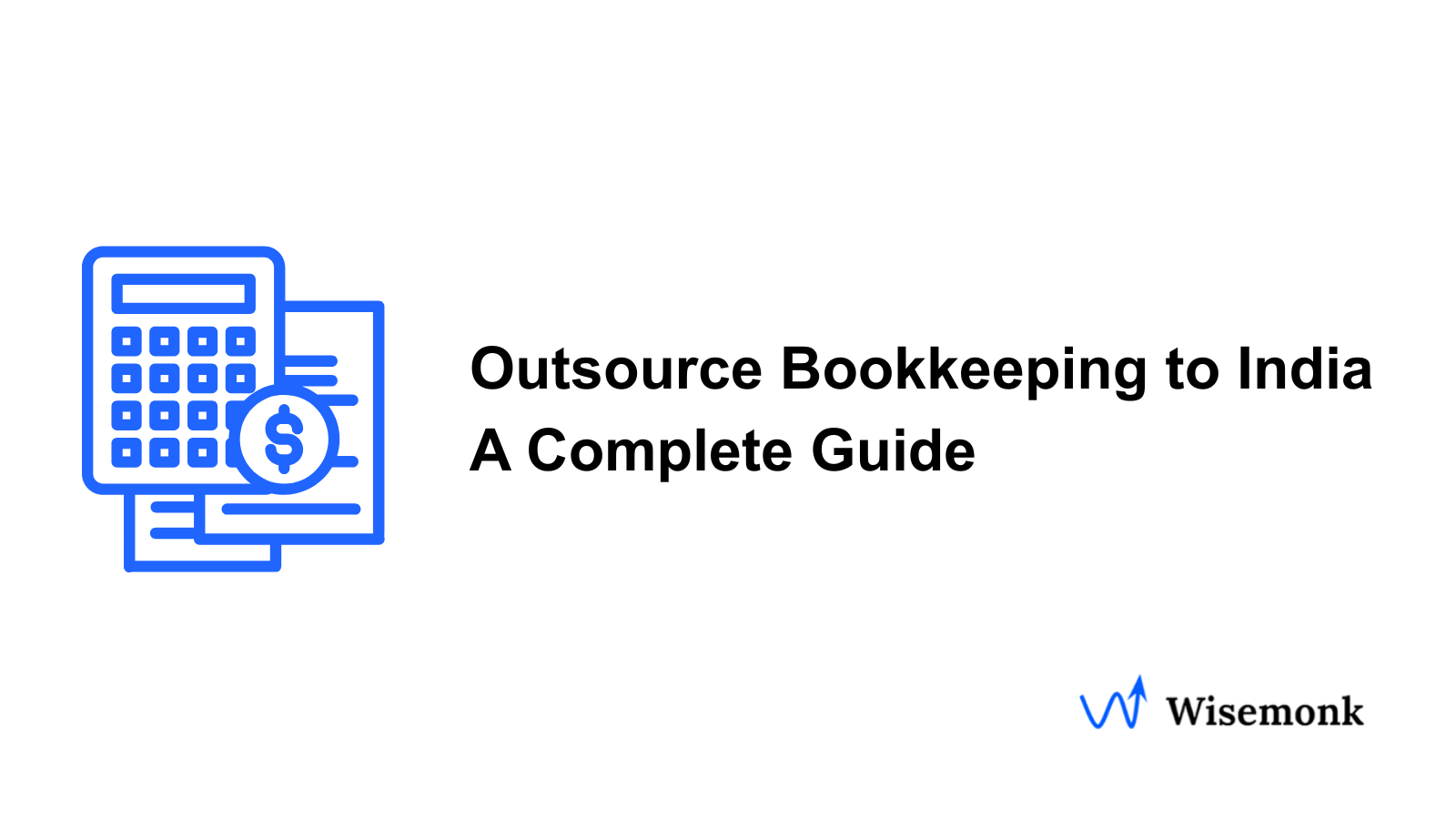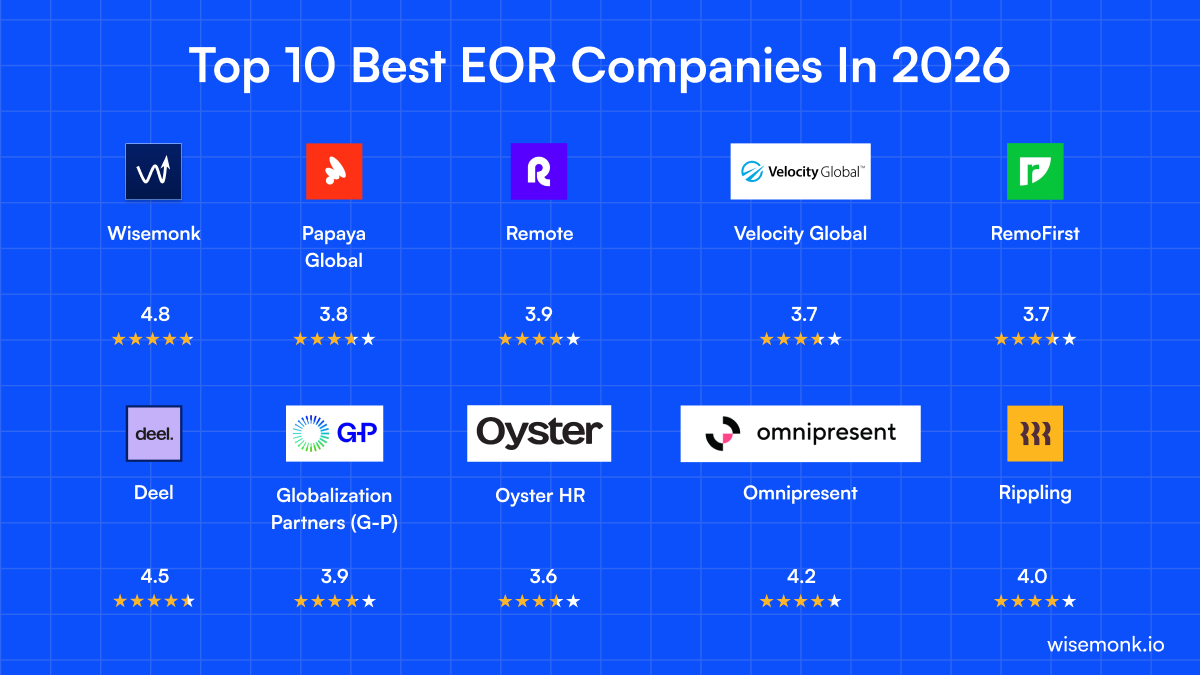- Outsourcing bookkeeping to India lets global companies delegate financial tasks like accounting, payroll, and tax preparation to skilled Indian professionals.
- India is preferred for its expert talent, advanced accounting software, strong data security, and cost efficiency.
- Businesses can outsource bookkeeping functions such as financial reporting, payroll processing, tax filing, reconciliations, and management reporting while ensuring compliance with global standards.
- To outsource bookkeeping successfully, choose a trusted Indian partner, define your scope, set up secure systems, and onboard dedicated bookkeepers to handle daily financial operations smoothly.
Ready to outsource your bookkeeping team to India? Contact us today!
Discover how we create impactful content.
Thinking about outsourcing your bookkeeping to India? You’re not alone. More global businesses are choosing India for reliable, accurate, and affordable bookkeeping support handled by expert accountants who know how to keep your financials clean and compliant.
In this guide, we cover everything you need to know about outsourcing bookkeeping to India, from how it works and what services you can outsource to key benefits, risks, and the best ways to get started. By the end, you’ll know exactly how to build a reliable bookkeeping setup in India for your global business.
What does it mean to outsource bookkeeping to India?[toc=Introduction]
Outsourcing bookkeeping to India means hiring Indian accounting firms or dedicated bookkeepers to handle your company’s financial records, transactions, and reports remotely. Instead of maintaining an in-house bookkeeping team, global businesses rely on outsourced accounting services from India to manage financial data, ensure regulatory compliance, and prepare accurate financial reports efficiently and cost-effectively.
In simple terms, bookkeeping outsourcing to India lets you delegate day-to-day accounting tasks like financial reporting, tax preparation, and financial statement creation to expert teams that ensure data integrity, data security, and strict confidentiality protocols. The result? Better accuracy, lower labor costs, and more time for strategic decision-making.
Why are global businesses outsourcing bookkeeping to India?[toc=Why Outsource to India]
Global businesses outsource bookkeeping to India because it offers expert-led accounting and bookkeeping services at scale, high accuracy, and significant cost savings without compromising quality.
Indian firms combine skilled professionals, advanced accounting software, and deep expertise in international standards to deliver precise financial reporting and ensure regulatory compliance for clients across the US, UK, and Europe.
From our experience working with global clients, here are the main reasons businesses prefer outsourcing bookkeeping services to India:
- Access to Skilled Talent: India has a massive pool of qualified accountants and dedicated bookkeepers familiar with GAAP and IFRS standards. Many hold certifications like CPA, ACCA, or CA, ensuring accurate financial records and reliable financial management.
- Advanced Technology and Tools: Indian firms use leading accounting software like QuickBooks, Xero, Zoho Books, and NetSuite for financial transactions, tax preparation, and payroll processing, ensuring transparency and error-free work.
- Cost Efficiency: Outsourcing helps businesses cut labor costs by up to 60% compared to maintaining an in-house team. This frees up valuable time and budget to focus on core competencies and strategic decision making.
- 24/7 Operations and Faster Turnaround: The time zone advantage means offshore bookkeepers in India can process financial data overnight, keeping your financial records up to date by the next business day.
- Data Security and Confidentiality: Reputed Indian firms follow strict confidentiality protocols, ensuring data integrity, data confidentiality, and compliance with GDPR and SOC-2 standards to protect sensitive financial information.
- Scalability and Flexibility: Whether it’s tax season or rapid business growth, Indian providers offer tailored engagement models and scalable solutions that adapt to changing business needs without disrupting operations.
- Focus on Core Business Activities: By delegating routine accounting tasks like reconciliations, tax filing, and financial statements, companies can focus on core business initiatives that drive revenue and innovation.
Simply put, outsourcing bookkeeping to India gives global companies access to professional services that ensure compliance, accuracy, and efficiency while freeing internal teams from financial stress and repetitive tasks.
What bookkeeping services can be outsourced to India?[toc=What Services Can Outsource]
Global businesses can outsource nearly all bookkeeping services and accounting tasks to India, from day-to-day financial recording to complex financial reporting and tax preparation. Indian accounting firms offer comprehensive outsourced accounting services that ensure accurate financial records, maintain data integrity, and help companies stay compliant with international accounting standards.
From our experience helping US businesses and global clients manage their finances efficiently, here are the key bookkeeping solutions most often outsourced to India:
- General Bookkeeping: Recording financial transactions, reconciling bank accounts, managing ledgers, and maintaining accurate financial records.
- Accounts Payable and Receivable Management: Tracking invoices, vendor payments, and receivables to optimize cash flow and avoid payment delays.
- Payroll Processing: Handling salary calculations, tax deductions, and employee benefits while ensuring full regulatory compliance and accurate documentation.
- Tax Preparation and Filing: Preparing tax returns, managing compliance with local and international tax laws, and helping businesses stay audit-ready throughout the tax season.
- Financial Reporting and Analysis: Preparing monthly, quarterly, and annual financial statements, including profit and loss reports, balance sheets, and cash flow statements, is essential for strategic decision-making.
- Bank and Credit Card Reconciliation: Matching transactions to ensure consistency between company records and bank statements.
- Management Reporting: Delivering accurate reports and KPIs to help leadership teams make data-driven business decisions and assess financial health.
- Software Setup and Maintenance: Implementing and managing cloud-based accounting software like QuickBooks, Xero, or Zoho Books to streamline financial operations and ensure data security.
- CFO Support and Advisory: Providing advanced financial management insights, forecasting, and budgeting support for growing small businesses or enterprises without full-time CFOs.
Indian firms typically offer tailored engagement models, allowing companies to choose between partial or full-service outsourcing bookkeeping based on their business needs. Whether you’re a CPA firm managing multiple clients or a startup scaling fast, outsourcing ensures professional services, scalable solutions, and client satisfaction across every financial process.
What are the different ways to outsource bookkeeping to India?[toc=Outsourcing Options]
When global businesses consider outsourcing bookkeeping services to India, there are a few different ways to get the job done, depending on how much control, compliance responsibility, and management involvement they want to retain.
In simple terms, companies can either build their own team in India or outsource the function entirely to a trusted service provider. Here’s how each option works:

1. Build an In-House Team
You can hire your own bookkeepers and accountants in India by setting up a local legal entity. This gives you full control over your financial operations, team structure, and accounting standards.
However, it also means taking on local regulatory compliance, payroll processing, tax filing, and HR obligations, which can be time-consuming and costly.
Alternative: Many global clients avoid this complexity by partnering with an Employer of Record (EOR). An EOR legally employs your Indian team on your behalf, managing payroll, benefits, and regulatory compliance, while you retain day-to-day control over work and financial management.
2. Outsource the Work
If you don’t want to hire directly, you can outsource bookkeeping to India in two main ways:
- Staffing / Staff Augmentation:
In this model, the outsourcing company provides dedicated bookkeepers or accounting professionals who work exclusively for you, though they remain employed by the service provider. You manage their daily tasks while the provider handles all HR and compliance functions.
This model is ideal for businesses that want ongoing control but need help with labor costs, scalable solutions, and data security. - Managed Services / Full Function Outsourcing:
Here, you partner with an accounting outsourcing company or bookkeeping services provider that takes full responsibility for your financial operations. They handle everything from financial data entry and tax preparation to financial reporting and compliance.
This approach suits businesses that prefer a hands-off model with guaranteed accurate reports, data confidentiality, and high client satisfaction.
3. Hybrid Engagement Models
Some companies use a mix of both, keeping sensitive financial information in-house while outsourcing repetitive accounting tasks like reconciliations or payroll processing to trusted Indian firms.
From our experience helping global businesses across the US, UK, and Europe, the best model depends on your company’s business needs, risk tolerance, and appetite for control.
Whether you want to hire bookkeepers through an EOR, augment your team with offshore talent, or fully outsource accounting and bookkeeping services, Wisemonk can help you design a tailored engagement model that aligns with your growth strategy and ensures compliance, data integrity, and long-term business success.
What should you consider before outsourcing bookkeeping to India?[toc=Key Considerations]
Before you outsource bookkeeping to India, it’s important to evaluate key factors that impact accuracy, compliance, and long-term success. Choosing the right outsourcing partner can make a huge difference in how effectively your financial operations are managed and how securely your financial data is handled.
From our experience working with global clients, here are the most critical points to consider before outsourcing:
- Experience and Expertise: Choose an accounting outsourcing services provider with a proven track record in serving US businesses and global clients. Check their experience in handling financial records, tax preparation, and financial reporting under GAAP, IFRS, or your country’s accounting standards.
- Data Security and Confidentiality: Your partner will handle sensitive financial information, so verify their data confidentiality policies. Ensure they follow strict confidentiality protocols, use secure servers, and comply with frameworks like GDPR, SOC 2, or ISO 27001 to protect your financial data and maintain data integrity.
- Technology and Accounting Software: Confirm that your outsourcing partner uses modern accounting software such as QuickBooks, Xero, NetSuite, or Zoho Books. Integration with your existing tools ensures smooth financial management, real-time access, and accurate financial records.
- Communication and Collaboration: Since you’ll be working across time zones, make sure the provider offers clear communication channels, regular updates, and dedicated support. Consistent interaction helps avoid confusion and ensures smooth coordination during financial reporting or tax filing cycles.
- Scalability and Flexibility: Your business needs may evolve, especially during tax season or rapid business growth. Select a provider that offers scalable solutions and tailored engagement models, allowing you to expand or scale down services as needed.
- Compliance and Legal Knowledge: Ensure the team has deep expertise in regulatory compliance, payroll laws, and tax filing for your target region. This guarantees that your financial transactions and bookkeeping solutions meet local and international compliance requirements.
- Cost Transparency: While cost savings are a big reason to outsource, make sure you understand the full pricing model. Avoid firms that offer unusually low rates without clear service details, as that can compromise quality and data security.
- Reputation and Client Reviews: Always check reviews, case studies, and client testimonials. A good reputation signals professional services, high client satisfaction, and reliability in managing outsourced accounting services.
When you evaluate these factors carefully, outsourcing bookkeeping services to India can become a long-term strategic move that strengthens financial health, reduces labor costs, and gives your team more time to focus on core business activities and strategic decision making.
How do you outsource bookkeeping to India?[toc=How to Outsource]
Outsourcing bookkeeping to India is a straightforward process when done with the right strategy and partner. It involves selecting a trusted provider, defining clear goals, and setting up a workflow that ensures accuracy, data security, and smooth communication between teams.
Based on our experience helping global businesses outsource accounting and bookkeeping services, here’s a practical step-by-step approach:

Step 1: Identify Your Needs
Start by defining what you want to outsource, full bookkeeping services, payroll processing, tax preparation, or specific accounting tasks. Understanding your scope helps in choosing the right bookkeeping solutions and engagement model.
Step 2: Research and Shortlist Providers
Search for reputable accounting firms in India that specialize in outsourcing bookkeeping services for US businesses or other global markets. Review their experience, certifications, client portfolio, and expertise in tools like QuickBooks, Xero, or NetSuite.
Step 3: Evaluate Data Security Measures
Before sharing financial data, ensure your chosen partner follows strict confidentiality protocols and has secure systems for data integrity and financial information protection. Ask about their compliance with GDPR, SOC 2, or ISO standards.
Step 4: Define the Scope and Agreement
Clearly outline responsibilities, timelines, pricing, and reporting expectations in a service-level agreement (SLA). This step is crucial to avoid misunderstandings and ensure accountability.
Step 5: Set Up Accounting Systems
Your partner will integrate accounting software for seamless collaboration and financial transactions management. Cloud-based platforms ensure real-time access to financial records and transparent updates.
Step 6: Onboard Your Dedicated Bookkeepers
Once systems are in place, the provider assigns dedicated bookkeepers or an expert team trained in your preferred processes. They’ll handle day-to-day entries, reconciliations, and financial reporting aligned with your business goals.
Step 7: Maintain Communication and Oversight
Establish regular check-ins, reporting schedules, and review meetings to ensure quality control. Strong collaboration keeps your outsourced accounting services aligned with company goals and helps identify opportunities for optimization.
Step 8: Review Performance and Optimize
Periodically evaluate deliverables for accuracy, efficiency, and client satisfaction. Use the insights to refine workflows or expand outsourcing services as your business growth demands.
What are the common risks and challenges?[toc=Risks & Challenges]
While outsourcing bookkeeping to India offers major advantages like cost savings, scalability, and expert support, it also comes with a few challenges that businesses should plan for early. The good news is that with the right systems and partner, most of these risks are easy to manage.
From our experience working with global clients, here are the most common risks, and how to avoid them:
1. Data Security and Confidentiality Risks: Sharing sensitive financial information across borders can create security concerns if not handled properly.
How to avoid it: Partner with firms that follow strict confidentiality protocols, use encrypted systems, and comply with GDPR or SOC 2 standards. Always sign NDAs and review their data integrity policies before starting.
2. Communication Barriers and Time Zone Gaps: Different time zones or communication styles can slow down response times or create confusion.
How to avoid it: Choose a provider that offers 24/7 support and dedicated account managers. Set up clear communication channels like Slack, Teams, or email reporting to maintain daily coordination.
3. Quality Control Issues: Inconsistent quality or delayed financial reporting can affect business decisions and compliance.
How to avoid it: Establish standard operating procedures (SOPs), review accurate reports regularly, and use shared dashboards to track progress. Opt for firms with strong QA processes and client satisfaction records.
4. Compliance and Accounting Standards Differences: Local Indian practices may differ from US accounting standards or international norms.
How to avoid it: Ensure your partner has certified accountants (CPA, ACCA, or CA) experienced in GAAP, IFRS, and cross-border regulatory compliance.
5. Over-dependence on a Single Provider: Relying too heavily on one outsourced accounting services provider can create risks if there’s disruption.
How to avoid it: Maintain backups of financial records, define exit clauses in your contract, and consider a phased engagement or multiple partners for redundancy.
6. Hidden Costs or Misaligned Expectations: Low-cost providers may include hidden fees or deliver incomplete bookkeeping services.
How to avoid it: Always request transparent pricing, detailed service breakdowns, and clear performance benchmarks in your contract.
7. Lack of Cultural Understanding: Minor differences in work culture or expectations can lead to misunderstandings.
How to avoid it: Invest time in onboarding, sharing your company values, and setting expectations for communication, response times, and financial operations updates.
When managed proactively, these challenges rarely impact outsourcing bookkeeping services to India. With the right partner, businesses enjoy seamless operations, strong data security, and accurate financial records that support strategic decision-making and long-term business growth.
How Wisemonk helps global businesses outsource bookkeeping to India?[toc=How Wisemonk Helps]
Wisemonk is a leading Employer of Record (EOR) and outsourcing partner helping global businesses hire, pay, and manage skilled professionals in India without setting up a local entity. From bookkeeping services to full-scale accounting outsourcing, we simplify your expansion into India by combining local compliance expertise, technology, and a vetted talent network.
Here’s how Wisemonk helps you seamlessly outsource bookkeeping to India:
- End-to-end accounting and bookkeeping support: Manage daily financial transactions, tax preparation, and financial reporting with accuracy and compliance.
- Dedicated offshore bookkeepers: Access skilled professionals trained in international accounting standards and experienced with tools like QuickBooks and Xero.
- Payroll and compliance management: We handle payroll processing, statutory filings, and ensure full regulatory compliance for your remote Indian team.
- Data security and confidentiality: All operations follow strict confidentiality protocols to protect sensitive financial information and maintain data integrity.
- Flexible and scalable engagement models: Choose between EOR, staff augmentation, or full-service outsourcing bookkeeping solutions, tailored to your business needs.
Beyond bookkeeping, Wisemonk also helps global companies build entire teams in India across finance, operations, tech, and customer experience. Our broader services include EOR solutions, talent hiring, payroll administration, equipment procurement, and India entity setup. Whether you need one bookkeeper or a complete offshore finance team, Wisemonk ensures your India operations run smoothly, compliantly, and ready to scale.
Talk to our specialists today and discover how Wisemonk can help with outsourcing bookkeeping to India with confidence!
Frequently asked questions
How to get outsourcing work from the USA to India?
To get outsourcing work from the USA, build partnerships with US businesses or CPA firms looking to reduce costs and scale operations. Showcase your expertise in accounting and bookkeeping services, data security, and regulatory compliance. Having a professional website, verified client testimonials, and certifications in tools like QuickBooks or Xero also helps. Networking on LinkedIn, joining outsourcing marketplaces, and offering free consultations are proven ways to attract global clients.
Why do accounting firms outsource to India?
Accounting firms outsource to India for access to skilled professionals, lower labor costs, and faster turnaround times. Indian bookkeeping outsourcing companies provide trained accountants familiar with US accounting standards, GAAP, and tax preparation. This allows firms to focus on core business activities like client management and audits while Indian teams handle financial data entry, reconciliations, and financial reporting with accuracy and confidentiality.
How much cheaper is it to outsource to India?
Outsourcing to India can reduce costs by 50% to 70% compared to hiring in-house staff in the US or UK. The savings come from lower labor costs, minimal overhead expenses, and access to scalable solutions. For example, hiring an experienced bookkeeper in the US may cost $4,000 to $6,000 per month, while the same role in India can be delivered by a certified professional for around $1,500 to $2,500 monthly, depending on scope and experience.
Is outsourcing to India a good idea?
Yes, outsourcing to India is one of the most effective ways for global businesses to access top accounting talent, maintain accurate financial records, and save time on repetitive accounting tasks. Indian firms ensure data integrity, strict confidentiality protocols, and regulatory compliance, making them ideal partners for outsourced accounting services. When done with a trusted provider, it helps businesses improve financial management and focus on growth.
How much does it cost to outsource accounting services?
The cost of outsourcing accounting services to India varies depending on business size and scope. On average, small businesses spend $300 to $1,000 per month, while mid-sized companies may spend $1,500 to $3,000 per month for full-service accounting and bookkeeping support. Pricing usually includes financial reporting, tax filing, payroll processing, and financial statement preparation.
How much should a small business pay for an accountant?
A small business typically pays between $250 and $1,000 per month for ongoing bookkeeping and accounting services when outsourcing to India. Costs depend on the complexity of financial transactions, number of accounts, and level of financial reporting required. Outsourcing helps small businesses maintain financial health and compliance without the overhead of a full-time in-house team.
How much should an accountant cost for a small business?
For small businesses, a qualified accountant usually costs around $30 to $50 per hour in India, compared to $80 to $150 per hour in the US. Many Indian providers offer monthly packages covering bookkeeping, tax preparation, and financial statements, giving predictable pricing and reliable financial operations support. This makes India a cost-effective and trusted option for global companies seeking quality accounting assistance.

.png)
%20(1).webp)
